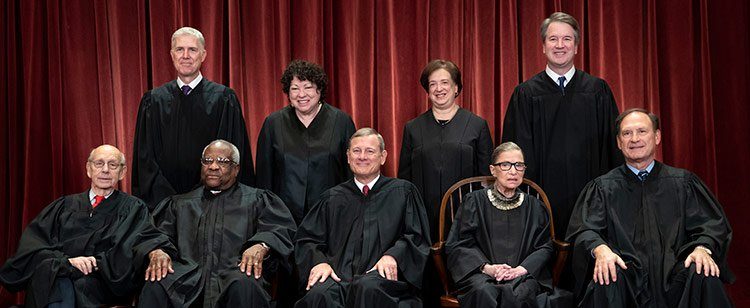Hiya Law,
Please pay careful attention to the Supreme Court as it behaves as we predicted in class, most recently through its 5-4 decision to reject Democratic efforts to postpone voting in Wisconsin last Tuesday due to the pandemic. The majority considered it a “narrow, technical” decision that refused to extend absentee voting as per state law.
In his Wednesday story, the Times’ Adam Liptak referred to “the optics [of the vote], which were certainly ugly,” and described Justice Ruth Bader Ginsburg’s “blistering dissent,” in which she wrote the majority’s reasoning “boggles the mind”:
“While I do not doubt the good faith of my colleagues,” she wrote, “the court’s order, I fear, will result in massive disenfranchisement.”
While Roberts insists the court is not political, he wrote the majority 5-4 opinion in a 2013 case “that effectively gutted the Voting Rights Act”:
Freed from the act’s constraints, states controlled by Republicans almost immediately started imposing an array of restrictions on voting, including voter ID laws, cutbacks on early voting and purges of voter registration rolls.
On the same day as the Supreme Court decision on WI voting, the WI Supreme Court struck down the Democratic Governor’s order to delay the election. The two decisions taken together meant voters stood in long lines for hours, some wearing masks, to exercise their right to vote, or stayed home, as they had been advised to do for their own safety.
How will these two decisions impact the numbers of people who were able to vote and the election’s outcome? And how will the courts handle the next questions about elections? Stay tuned.
Today’s assignment is to watch PBS Frontline’s “News War”: Part I, Sections 4, 5, 6 and 7, and Part II, Section 15. This documentary was filmed around the time of the Valerie Plame case, when several journalists were ordered to reveal the source who leaked the identity of Plame, a secret government operative. Pay special attention to 1) Earl Caldwell, 2) James Goodale, 3) Carl Bernstein, 4) William Safire and, finally in Part II, 5) Josh Wolf.
Your assignment is to explain in a few lines the most significant point or two made by each of these five journalists. (Goodale is an attorney, but he has the heart of a reporter.) Write a summary paragraph at the end about what you learned from this doc. This assignment (about two pages) is due by 1 p.m. next Tuesday.
Remember for Test #3 to keep up with all outlines, assigned readings, assignments and emails—all of which will be reflected on the test. And, as always, let me know if you have questions.
Have a great weekend!
All best,
k


